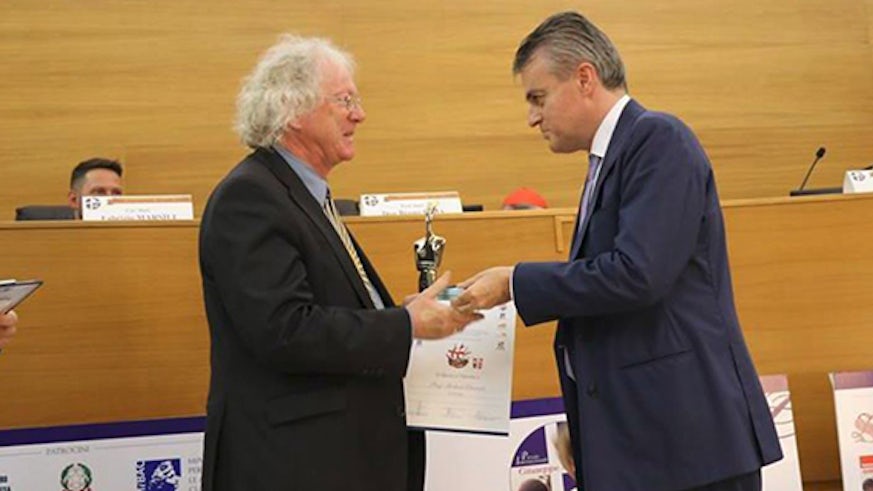International awards for School of Physics and Astronomy academics
1 February 2019

Professors Mike Edmunds and Matt Griffin have received prestigious international awards for their research work.
Emeritus Professor Edmunds received the Giuseppe Sciacca International Award for Physics by the International Association of Culture and Voluntary Work in an award ceremony in the Pontifical Urbaniana University, Vatican City, Rome, in October 2018.
This award recognises people who have distinguished themselves in various fields of knowledge and art, and who have been a moral and educational example in the development of society. Professor Edmunds was given the award in recognition of his research and public engagement work on the Antikythera Mechanism. This precious artefact was discovered in 1900, in a Mediterranean shipwreck from the first century BC. Its function and workings remained unclear until Professor Edmunds and colleagues, using advanced X-ray imaging techniques, showed it to be the earliest known astronomical calculating machine, and a device of extraordinary technical and mathematical sophistication, changing our understanding of key aspects of ancient Greek civilisation.
Professor Edmunds said: “I’m delighted at this recognition of the scientific and cultural significance of the Antikythera mechanism, and of the work that my colleagues and I have done to reveal its mysteries.”
Professor Griffin of the School’s Astronomy Instrumentation Group received an honorary degree (Docteur Honoris Causa) from the Université Aix-Marseille in November 2018, in recognition of his role as Principal Investigator of the Herschel-SPIRE instrument, leading an international consortium of eighteen institutes in eight countries. The degree is conferred on those who have carried out distinguished research in collaboration with Université Aix-Marseille. Previous physicists awarded the distinction of Docteur Honoris Causa by Aix-Marseille include Sir John Pendry and Nobel Laureate Saul Perlmutter.

SPIRE was one of three scientific instruments that flew on the European Space Agency’s Herschel Space Observatory, which operated very successfully between 2009 and 2013, observing the Universe at far infrared wavelengths that are blocked by the Earth’s atmosphere.
Professor Griffin and the Cardiff University Astronomy Instrumentation Group have a long record of collaboration with the Laboratoire D’Astrophysique de Marseille (LAM), on Herschel and other scientific projects. LAM scientists and engineers designed the SPIRE optical system and built a very precise mechanism for the instrument’s spectrometer.
In his acceptance speech, Professor Griffin emphasised the value of the long-standing collaboration between the Cardiff and Marseille groups, and praised the quality of the technical and scientific participation by Marseille engineers and scientists in the SPIRE project. He stressed that he saw the award as recognition for the efforts and achievements of the very large international team that made Herschel and SPIRE possible.

